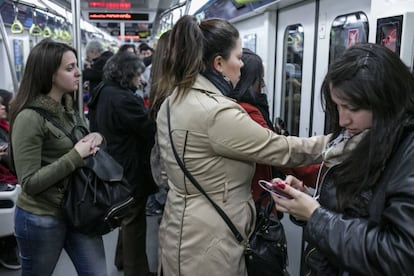Female subway workers in Buenos Aires strike to protest machismo
Employees say they deal with aggressive behavior and taunts from male passengers every day

Sexist violence is on display everywhere in Argentina: at the office, on the street, inside ministries and on television screens.
But there is one public space where gender abuse is most evident and pervasive: the Buenos Aires subway, or subte as it is locally known. The problem has reached such a point that there has even been a debate on whether some subway cars should be reserved for women.
They think we like it when the train pulls out of the station and they say ‘you’re so pretty’
Milagros, subway employee
The A line, the oldest in South America (it was founded in 1913), registered a shocking incident a year ago: a man masturbated on the skirt of a woman who was next to him. Other passengers kicked the man out of the subway car, and the police arrested him.
And that is just one example of the kind of incidents that take place on a daily basis. That is why the female workers of the A line decided to hold a one-hour strike on Wednesday in a bid to raise awareness about their daily reality on the job.
There are over 900 women working for the Buenos Aires underground transit system out of a 2,200-strong workforce. They are witnesses to the daily harassment suffered by female commuters, and become occasional victims themselves at the hands of male colleagues and passengers.
In recent years, women employees have been allowed to hold jobs that used to be reserved for men, such as drivers and guards. But technical jobs and night shifts are still off limits to them.

“As a guard, it happened to me that a man got into the cabin with me while the train was in motion,” explains Marta, a subway employee. “He told me ‘I’m riding with you.’ I felt in a very vulnerable situation, and I’m sure that if I hadn’t been a woman it wouldn’t have happened to me. I had to pull the emergency brake.”
“It is socially accepted, and they think we like it when the train pulls out of the station and they say ‘you’re so pretty’ or ‘you’re hot.’ You’re working and you have men staring at you and telling you things. This doesn’t happen to men,” notes Milagros, another employee.
“Coexistence on the subway is the same as in all other areas where we socialize,” says Karina Nicoletta, secretary for gender issues at the subway employee union Asociación Gremial de Trabajadores de Subte y Premetro (AGTSyP).
“There is sexual harassment, abuse and violence aimed at female colleagues. It also happens that many female workers are going through situations of gender violence within their own families, and the union provides them with support,” she adds.
Leave of absence
Nicoletta celebrates the fact that it is now possible to ask for a leave of absence specifically for gender violence issues.
“It was very necessary because victims used to have to ask for medical or psychiatric leaves, and we needed to put into words what was really going on.”
The women who were interviewed for this story listed some of the taunts they have had to deal with in the past: “You closed the doors on me, blondie;” “Never mind, my love, I’ll ride with you in the cabin;” “You bitch, I’m going to be late because of you,” “you’ll see what happens when we get to the end of the line” and more.
“It’s important to underscore that both men and women need to be aware of this situation,” says Milagros before going back to work. “This is our job, we have to come here every day, and we need to raise our boys and girls in a different way, with a different awareness, a different sense of power.”
English version by Susana Urra.
Tu suscripción se está usando en otro dispositivo
¿Quieres añadir otro usuario a tu suscripción?
Si continúas leyendo en este dispositivo, no se podrá leer en el otro.
FlechaTu suscripción se está usando en otro dispositivo y solo puedes acceder a EL PAÍS desde un dispositivo a la vez.
Si quieres compartir tu cuenta, cambia tu suscripción a la modalidad Premium, así podrás añadir otro usuario. Cada uno accederá con su propia cuenta de email, lo que os permitirá personalizar vuestra experiencia en EL PAÍS.
¿Tienes una suscripción de empresa? Accede aquí para contratar más cuentas.
En el caso de no saber quién está usando tu cuenta, te recomendamos cambiar tu contraseña aquí.
Si decides continuar compartiendo tu cuenta, este mensaje se mostrará en tu dispositivo y en el de la otra persona que está usando tu cuenta de forma indefinida, afectando a tu experiencia de lectura. Puedes consultar aquí los términos y condiciones de la suscripción digital.








































